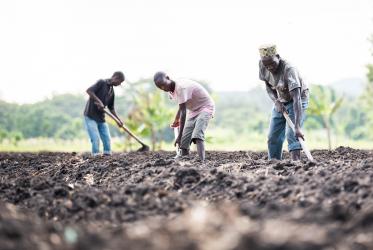Dr Manoj Kurian is coordinator of the World Council of Churches (WCC) Ecumenical Advocacy Alliance. We we are now in the midst of observing Churches’ Week of Action on Food, he reflects on this year’s theme, “Grow, Nourish, Sustain Together.”
Why should we observe the Churches' Week of Action on Food (11-17 October 2020)? Is hunger increasing?
Dr Kurian: Hunger is a continuing reality for more than a quarter of the world's population, with 2 billion people experiencing moderate and severe levels of food insecurity. Ten months into the COVID-19 pandemic, the situation regarding access to food and the livelihoods of people around the world has significantly worsened. The number of people facing acute food insecurity is expected to nearly double to 265 million in 2020, from 135 million in 2019.
Jesus Christ wanted us to see God in the other and respond, especially to those who are in need. Hunger and the pandemic are two sides of the same coin, affecting the most vulnerable in a disproportionate manner. Sixty percent of the world's workforce—accounting for two billion workers who are in informal employment—do not have access to a social safety net. Eighty precent of them are in sub-Saharan Africa.
An additional 140 million people will sink into extreme poverty, living on less than US$1.90 per day in 2020. Those who are living with disabilities, the aged, and those who have pre-existing disease conditions such as HIV, tuberculosis, and diabetes are additionally vulnerable.
What specific role does faith have to play in this situation?
Dr Kurian: Faith unites the majority of the world’s population. The church clearly brings people of different socio economic, regional, and political contexts together. The church and its institutions are present through time and continue to serve heroically, through thick and thin, deeply-rooted in community.
Faith communities are on the ground, supporting and accompanying communities in these difficult times. We need to celebrate this and share the stories of resilience, renewal and hope.
The week provides the possibility for the church to get people to reflect on the moral and ethical imperatives for humanity to respond to this ongoing challenge of hunger and disease, promoting transformation and sustained action at the community level and affecting policy change for the better.
How can we address the root problems of hunger?
Dr Kurian: We can address the root problems using the lens of the theme of the Word Food Day, “Grow, Nourish, Sustain Together.”
Grow. Let us get back to the basics and promote agro-ecological food production that is local, diverse and has a minimal negative impact on the earth and people. Let us ensure that small farmers, fisherfolk, and indigenous peoples have access to seeds, land, water, resources and markets.
Nourish. Let us share resources in solidarity and care for each other, ensuring that all people are entitled to adequate, affordable and nutritious food. Let us keep in mind the existing inequities already in place in many sections of the population, including women, children, those living with HIV, tuberculosis, and non-communicable diseases, people living with disabilities, the homeless and prisoners.
Sustain. Let us strive to halt the tremendous onslaught on the environment, the climate, biodiversity, and the very survival of many of our fellow creatures on earth, to produce food, by moving away from industrial agriculture. Let us live full lives sustainably, and let life flourish all around us.
Together. We can only achieve this with unity of vision, purpose and action. We cannot resolve hunger and disease in isolation. Climate change, pollution of land and water, ecological destruction, and viruses know no borders or walls.
What is the WCC doing to help with this transformation?
Dr Kurian: The WCC is providing worship resources, and in collaboration with regional ecumenical organizations, is inviting all to celebrate World Food Day on 16 October, with online prayer services across three time zones.
To keep the reflections and discussions active and productive, the WCC is also organizing a series of podcasts over this month, involving farmers and faith communities from different regions of the world.
Online prayer service for World Food Day
Download the prayer material in English, French, Spanish and Portuguese


